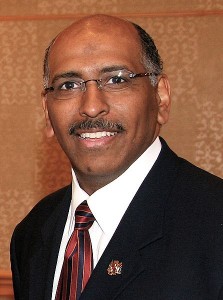By all accounts the gathering of grassroots conservatives for the American Conservative Union’s CPAC event in Prince George’s County, Maryland offered the right mix of hot rhetoric and new faces; reflection and assessment.
CPAC is often a good way to get a sense of the state of the conservative movement but more important, the state of its relationship with the Republican Party.
For many conservatives, that’s a tenuous relationship on a good day. As Erick Erickson, co-founder of RedState.com, noted, “I think CPAC is really RPAC these days and is as much, if not more, lobbyist oriented than grass-roots oriented. It is like church homecoming for the Republican Party.”
As the weekend proceedings wrapped up with a rousing call-to-arms by former Alaska Governor Sarah Palin, some basic questions remain for a movement in transition: Coming into the 2014 elections, are conservatives gaining strength or treading water? And how does any of this really translate to the rest of the country?
Polls show political conservatism is still very healthy despite liberal wailing to the contrary. In terms of electoral politics the conservative base and liberal base basically cancel each other out, with each side striving to reach enough independents in the political center to win nationwide or statewide elections. So, for the most part, it’s a draw.
But some of the polling of the CPAC attendees also reveals some interesting challenges and opportunities for conservatives. For example 41 percent believe marijuana should be legalized and taxed for recreational and medical use (21 percent believe marijuana should be legalized only for medical purposes when prescribed by a doctor) while 31 percent say it should remain illegal.
 Similarly, 78 percent cite their most important goal is to promote individual freedom by reducing the size and scope of government, while only 12 percent cite promoting traditional values by protecting traditional marriage and protecting the life of the unborn as their most important goal. Such findings are consistent with the libertarian leanings of the participants (46 percent of whom were between the ages of 18-25) but also are a sign of a changing demographic within the conservative movement itself.
Similarly, 78 percent cite their most important goal is to promote individual freedom by reducing the size and scope of government, while only 12 percent cite promoting traditional values by protecting traditional marriage and protecting the life of the unborn as their most important goal. Such findings are consistent with the libertarian leanings of the participants (46 percent of whom were between the ages of 18-25) but also are a sign of a changing demographic within the conservative movement itself.
While themes of freedom, faith and family were echoed throughout the weekend, speaker after speaker seem to have in mind those changing demographics inside and outside the hall as they came repeatedly back to strategy and what it will take to win in 2014.
Former Speaker Newt Gingrich cautioned “we must stop being the opposition movement, and we must become the alternative government movement that will help make the life of every American better so that they understand what we would do that would be right, not just what the left is doing that is wrong.” U.S. Senator Ted Cruz (R-Tx), a Tea Party favorite, urged conservatives to stick with core beliefs to win elections. “They say if you stand for principles, you lose elections. That is a false dichotomy.”
Governor Chris Christie (R-N.J.), insisted conservatives embrace a governing agenda that would help Republicans succeed this November and beyond. “We don’t get to govern if we don’t win. So please, let us come out of here resolved not only to stand for our principles, but let’s come out of this conference resolved to win elections again.”
And it is winning elections that has proven elusive since 2011. The lack of a cohesive message to voters, struggles over the “conservative brand” with its Tea Party base and the poor standing of the Republican-controlled Congress have all taken their toll (for example, 51 percent of CPAC attendees disapprove of the Republican Congress).
But many conservatives, like Sen. Cruz, feel in the end the failure of 2012 GOP presidential candidate Mitt Romney to effectively draw stark contrasts between his governing policies and the Obama agenda stands as an example of watered-down conservatism. As the Senator would make clear in his speech, “All of us remember President Dole and President McCain and President Romney — now look, those are good men, they’re decent men, but when you don’t stand and draw a clear distinction, when you don’t stand for principle, Democrats celebrate.”
But it would be another Tea Party favorite, Senator Mike Lee (R-Utah), who would warn against purging centrist Republicans, saying, “we as conservatives have got to be far more engaged in finding converts than in discarding heretics.” Senator Rand Paul (R-Ky.) drove the point even deeper. “You may think I am talking about electing a Republican. I am not,” Sen. Paul said. “I am talking about electing lovers of liberty. It isn’t good enough to pick the lesser of two evils. We must elect men and women of principle, and conviction and action that will lead us back to greatness.”
Senators Lee and Paul are closer to the truth for both conservatives and the Republican Party: It is a false choice we sometimes make between core principles and good governance.
But many conservatives stand on the precipice of conservatism, ready to throw each other off because of such false choices; feeling they have lost their grip on what conservatism means and who is best positioned to articulate it.
As conservatives and Republicans assess their leadership, their strategy and ultimately the impact they will have on American politics in 2014 and beyond, they would be wise to heed the advice of the late conservative icon William F. Buckley Jr.: “Nominate the most conservative candidate who is electable.”









Leave a Reply